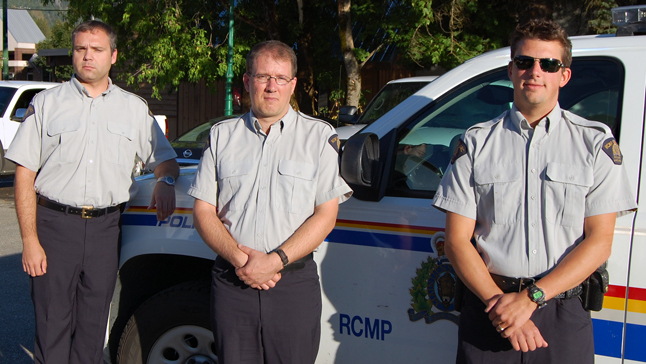
By David F. Rooney
The Mounties are looking for a few good men or women interested in becoming auxiliary constables. Do you qualify?
You have to be the kind of individual who sees real value in community service and, of course, you have to be able to pass a security check.
But the benefits are real.
“I needed something more that was fulfilling that made me feel as though I was contributing something to the community,” says Auxiliary Constable Joe Marcoffio, who is also an engineer with the CPR. “I wanted it to be my own thing and it had to be something that would be fulfilling and satisfying.”
And — bingo! — an auxiliary constable was born.
Ask any of the men who serve as auxiliary constable and they’ll tell you this is a volunteer job that gives them tremendous satisfaction. And it must do that. Some, like Joe Marcoffio, Paul Carter and Eric Scarcella have been putting on a uniform for years.
Being an auxiliary constable with the RCMP is not like being a security guard. Auxiliary constables are true peace officers with all of the powers that entails. They may not carry a firearm or a taser and they may work under the direction of regular members of the Force, but they have the same powers of arrest and receive much of the same training that uniformed Mounties get.
“What attracted me was crime in the community,” says Paul Carter, who is also the community’s Vicim Services Coordinator.”Nothing bothers me more than taking my dog for a walk in the morning and seeing a broken window or hearing about a neighbour being broken into. I’ve also had an interest in law right since high school.”
That interest grew for him as he grew older and he eventually made the decision to indulge that interest by joining the Force almost eight years ago as an auxiliary constable.
Like Marcoffio and Carter, Eric Scarcella juggles the demands of his job as a hotelier and family man and his desire to serve the public. Like Carter, he has children who ar deeply interested in his work with the Revelstoke detachment. And his kids get a kick out of seeing him wearing his uniform. One of his younger children always asks: “Where’s your police car, Daddy?”
“It’s quite cute,” Scarcella said with a smile.
And that work is in many ways identical to the services performed by professional policemen.
“They work right along side us,” says Cpl. Rod Wiebe. “They do a lot of community policing work and sometimes they’re right in the car beside us at night. As much as we try to differentiate between us by the uniforms we wear they have peace officer status. They can do everything we can do but we don;t like to think that would ever happen because it would mean something had happened to the member. But they are right along side our regular members. They are our partners.”
The biggest difference, Carter said, is one of supervision. In general, auxiliary constables operate under the guidance and direct supervision of regular members of the RCMP. In general, auxiliary officers undergo about 160 hours of training and then put in
Where there once were 12 auxiliaries in Revelstoke there are now just three experienced auxiliaries and four new ones ready for training. The detachment could use at least one more to help the detachment’s 20 regular Force members.
“Revelstoke is fairly quiet compared to some other communities,” Wiebe said. ‘However, we could always use more help as there is always lots of stuff we don’t get to and the community programs are the ones that are always hurt when we’re tied up doing the operational stuff. Therefor the auxiliary program is great because they help us provide enhanced services for the community.”
And that matters.
If you think you have what it takes to make a real contribution to community life as an auxiliary constable please call Const. Gary McLaughlin at the Revelstoke RCMP detachment 250-837-5255.



